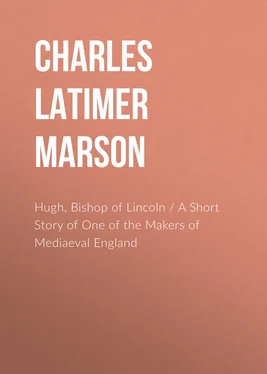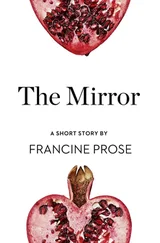Charles Latimer Marson - Hugh, Bishop of Lincoln / A Short Story of One of the Makers of Mediaeval England
Здесь есть возможность читать онлайн «Charles Latimer Marson - Hugh, Bishop of Lincoln / A Short Story of One of the Makers of Mediaeval England» — ознакомительный отрывок электронной книги совершенно бесплатно, а после прочтения отрывка купить полную версию. В некоторых случаях можно слушать аудио, скачать через торрент в формате fb2 и присутствует краткое содержание. Жанр: foreign_prose, foreign_antique, на английском языке. Описание произведения, (предисловие) а так же отзывы посетителей доступны на портале библиотеки ЛибКат.
- Название:Hugh, Bishop of Lincoln / A Short Story of One of the Makers of Mediaeval England
- Автор:
- Жанр:
- Год:неизвестен
- ISBN:нет данных
- Рейтинг книги:3 / 5. Голосов: 1
-
Избранное:Добавить в избранное
- Отзывы:
-
Ваша оценка:
- 60
- 1
- 2
- 3
- 4
- 5
Hugh, Bishop of Lincoln / A Short Story of One of the Makers of Mediaeval England: краткое содержание, описание и аннотация
Предлагаем к чтению аннотацию, описание, краткое содержание или предисловие (зависит от того, что написал сам автор книги «Hugh, Bishop of Lincoln / A Short Story of One of the Makers of Mediaeval England»). Если вы не нашли необходимую информацию о книге — напишите в комментариях, мы постараемся отыскать её.
Hugh, Bishop of Lincoln / A Short Story of One of the Makers of Mediaeval England — читать онлайн ознакомительный отрывок
Ниже представлен текст книги, разбитый по страницам. Система сохранения места последней прочитанной страницы, позволяет с удобством читать онлайн бесплатно книгу «Hugh, Bishop of Lincoln / A Short Story of One of the Makers of Mediaeval England», без необходимости каждый раз заново искать на чём Вы остановились. Поставьте закладку, и сможете в любой момент перейти на страницу, на которой закончили чтение.
Интервал:
Закладка:
Hugh of Avalon was born in Avalon Castle in 1140, a year in which the great tempest of Stephen’s misrule was raging. In France, Louis VII. has already succeeded his father, Louis VI.; the Moors are in Spain, and Arnold of Brescia is the centre of controversy. Avalon Castle lies near Pontcharra, which is a small town on the Bredo, which flows into the Isere and thence into the Rhone. It is not to be confused with Avallon of Yonne. The Alpine valleys about Pontcharra are lovely with flowers and waters, and have in them the “foot-prints of lost Paradise.” Burgundy here owed some loyalty to the empire rather than to France, and its dukes tried to keep up a semi-independent kingdom by a balanced submission to their more powerful neighbours. The very name Hugh was an old ducal name, and there is little doubt that William de Avalon, Hugh’s father, claimed kin with the princes of his land. He was a “flower of knighthood” in battles not now known. He was also by heredity of a pious mind. Hugh’s mother, Anna, a lovely and wealthy lady, of what stock does not appear, was herself of saintly make. She “worshipped Christ in His limbs,” by constantly washing the feet of lepers, filling these wretched outcasts with hope, reading to them and supplying their wants. She seems to have been a woman of intellectual parts, for though she died before Hugh was ten, he had already learned under her, if not from her, to use language as the sacrament of understanding and understanding as the symbol of truth. He had some grip of grammar and logic, and though he did not brood over “Ovid’s leasings or Juvenal’s rascalities,” rather choosing to ponder upon the two Testaments, yet we may gather that his Latin classics were not neglected. The spiritual life of Grenoble had been nourished by a noble bishop, also Hugh, who had seen the vision of seven stars resting upon a certain plot of ground, which induced him to grant the same to St. Bruno, the founder of the Grande Chartreuse. Here he served himself as a simple monk, laying aside his bishop’s robes, not a score of miles from Avalon. This Hugh was a religious and free thinking man, who, though he found evil a great metaphysical stumbling block to faith, yet walked painfully by the latter. He died in 1132 or thereabouts, and his life was most probably the occasion of our Hugh’s name, and of much else about him.
The De Avalons had two other boys both older than Hugh: William, who inherited the lands, and Peter, who was settled by his brother Hugh at Histon, in Cambridge, but he does not seem to have made England his home. Hugh had also at least one cousin, William, on his mother’s side, who attended upon him at Lincoln, and who (unless there were two of the same name) developed from a knight into an holy Canon after his great relative’s decease. These relatives were always ready to lend a hand and a sword if required in the good bishop’s quarrels. The last particularly distinguished himself in a brawl in Lincolnshire Holland, when an armed and censured ruffian threatened the bishop with death. The good Burgundian blood rose, and William twisted the sword from the villain’s hand, and with difficulty was prevented from driving it into his body.
When the Lady Anna died, her husband, tired of war, power, and governance, distributed his property among his children. Under his armour he had long worn the monk’s heart, and now he was able to take the monk’s dress, and to “labour for peace after life, as he had already won it in life.” So he took Hugh and Hugh’s money with him, and went off to the little priory of Villarbenoit (of seven canon power), which bordered upon his own lands, and which he and his forbears had cherished. This little priory was a daughter of Grenoble (St. Hugh of Grenoble being, as we infer, a spiritual splendour to the De Avalons), and, not least in attraction, there was a canon therein, far-famed for heavenly wisdom and for scholarship besides, who kept a school and taught sound theology and classics, under whom sharp young Hugh might climb to heights both of ecclesiastical and also of heavenly preferment. Great was the delight of the canons at their powerful postulant and his son, and great the pains taken over the latter’s education. The schoolmaster laid stress upon authors such as Prudentius, Sedulius, and Fulgentius. By these means the boy not only learnt Latin, but he also tackled questions of Predestination and Grace, glosses upon St. Paul, hymns and methods of frustrating the Arian. Above all, he was exercised in the Divine Library, as they called the Bible, taught by St. Jerome. Hugh was of course the favourite of the master, who whipt him with difficulty, and kept him from the rough sports of his fellow scholars, the future soldiers, and “reared him for Christ.” The boy had a masterly memory and a good grip of his work, whether it were as scholar, server, or comrade. The Prior assigned to him the special task of waiting upon his old father. That modest, kind-hearted gentleman was getting infirm, and the young fellow was delighted to be told off to lead him, carry him, dress and undress him, tie his shoes, towel him, make his bed, cook for him and feed him, until the time of the old knight’s departure arrived.
The dates of St. Hugh’s life and ministrations must be taken with a grain of salt. The authorities differ considerably, and it is impossible to clap a date to some of the saint’s way-marks without first slapping in the face some venerable chronicler, or some thought-worn modern historian. If we say with the Great Life that Hugh was ordained Levite in his nineteenth year, we upset Giraldus Cambrensis and the metrical biographer, who put it in his fifteenth; and Matthew Paris and the Legend, who write him down as over sixteen. Mr. Dimock would have us count from his entry into the canonry, and so counts him as twenty-four; Canon Perry and Father Thurston say “nineteenth year,” or “nineteen.” The Canons Regular of Villarbenoit seem to have been rather liberal in their interpretation of church regulations, but it is hardly likely that the bishop of Grenoble would so far stretch a point as to ordain a lad much below the canonical age, even if he were of a great house and great piety. Anyhow it is hardly worth while for the general reader to waste time over these ticklish points. It is enough to say that Hugh was ordained young, that he looked pink and white over his white stole and broidered tunic, and that he soon preached vigorously, warmly, and movingly to the crowd and to his old acquaintances. Sinners heard a very straightforward message, and holy persons were edified by the clever way in which he handled difficult topics, and in him they “blessed the true Joseph, who had placed his own cup in the mouth of his younger brother’s sack.” Indeed, he must have been a captivating and interesting young man, and since he was so strikingly like Henry II. of England that folks’ tongues wagged freely about it, we may picture him as a young man of moderate height, rather large in the brow, with red brown hair, bright grey eyes, large chest, and generally of an athletic build and carriage. He had a face which easily flushed and told both of anger and a lively sense of humour.
Читать дальшеИнтервал:
Закладка:
Похожие книги на «Hugh, Bishop of Lincoln / A Short Story of One of the Makers of Mediaeval England»
Представляем Вашему вниманию похожие книги на «Hugh, Bishop of Lincoln / A Short Story of One of the Makers of Mediaeval England» списком для выбора. Мы отобрали схожую по названию и смыслу литературу в надежде предоставить читателям больше вариантов отыскать новые, интересные, ещё непрочитанные произведения.
Обсуждение, отзывы о книге «Hugh, Bishop of Lincoln / A Short Story of One of the Makers of Mediaeval England» и просто собственные мнения читателей. Оставьте ваши комментарии, напишите, что Вы думаете о произведении, его смысле или главных героях. Укажите что конкретно понравилось, а что нет, и почему Вы так считаете.












